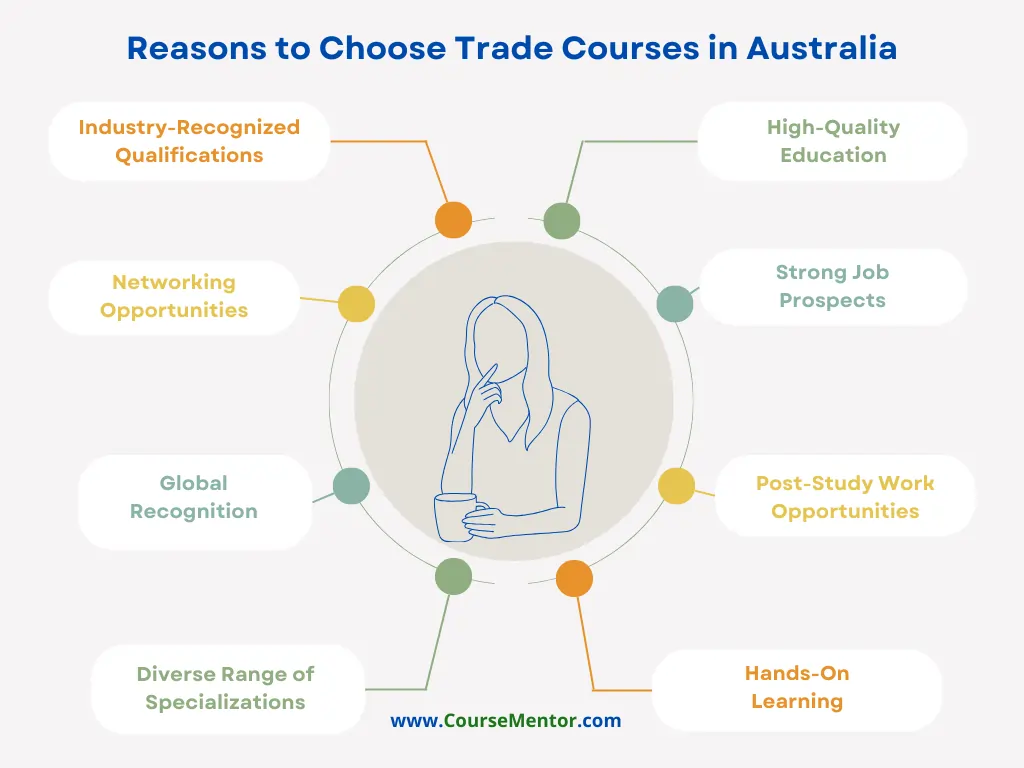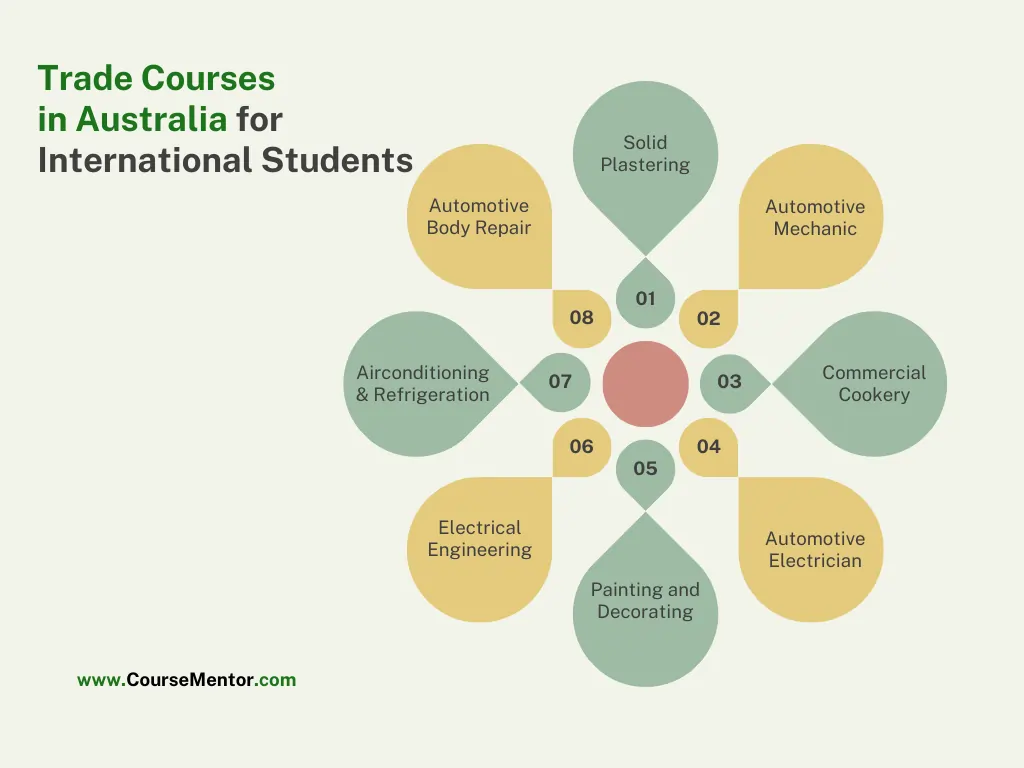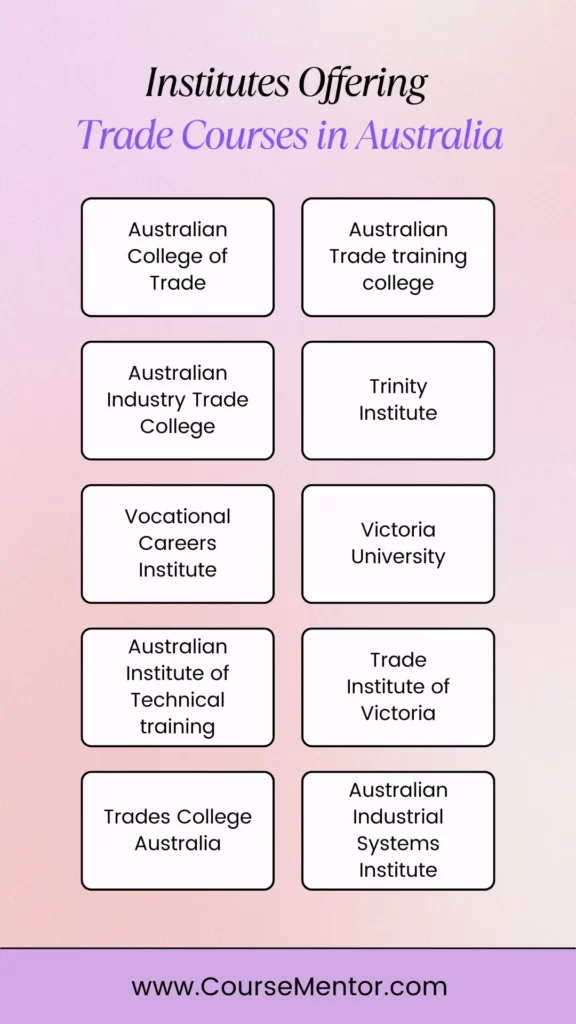As an international student, considering pursuing trade courses in Australia will be the best career choice. Moreover, Australia has long been a preferred destination for international students seeking high-quality education and a vibrant cultural experience.
In addition, Australia also offers a wide range of trade courses that provide excellent career opportunities for international students. Whether you’re interested in becoming an electrician, plumber, chef, or any other skilled professional. Australia’s vocational education and training (VET) sector has much to offer to students.
Are you eager to know about various trade courses available to students? If yes, then look no further, in this blog, we’ll explore why choose trade courses in Australia, the list of popular trade courses in Australia, and the best institutes offering these courses in Australia.
Trade Courses in Australia
Trade Courses in Australia have also become popular among the international students. These courses are often called vocational education and training (VET) courses. Moreover, these courses are educational programs that equip students with the practical skills and knowledge required for specific trades or industries.
These courses are designed to prepare individuals for careers in skilled professions and are integral to Australia’s education system. Furthermore, it also offers many benefits to international students. So now, let’s discuss about it.
Why choose trade courses in Australia?
The main reason to choose trade courses in Australia is its various benefits to international students. Choosing these courses in Australia is wise for international students seeking a combination of high-quality education, strong career prospects, and a multicultural environment.

With a focus on practical skills and industry relevance, these programs prepare you for a successful career in various skilled professions, making Australia an attractive destination for those looking to invest in their future.
Popular Trade Courses in Australia for International Students
Now you have all the information on the overview and benefits of choosing a trade course. To pursue a trade course in Australia, a student must learn under a qualified tradesperson, which usually involves apprenticeships.
Moreover, the apprenticeship period lasts 1 to 2 years for international students, whereas it lasts 4 years for Australian students. But the best part is that domestic and international students receive the same qualifications.

Here are the various popular trade courses in Australia with highlights on course duration, cost of studying, available intakes, and location where these courses are available for International Students:
1. Carpentry
Carpentry courses focus on woodworking skills and construction techniques, preparing students for careers as carpenters in the building industry. In this, an international student studies how to plan and organize the work, construct wall frames, roof framing, etc.
| Course Duration | 12 – 24 Months |
| Cost of Studying | $9,000 – $15,000 |
| Available Intakes | January and July (April and October in Melbourne only) |
| Location | Brisbane, Gold Coast (*regional), Sydney, Melbourne, Perth (*regional), Sunshine Coast (*regional), Adelaide (*regional) |
| Post-Study Salary | $1358 per week |
2. Mechanic
Courses in automotive technology and mechanics teach students how to diagnose complex engine faults and how to maintain and repair vehicles. Moreover, students also learn electronic spark ignition engine management and braking systems. The major highlights related to this course are as such:
| Course Duration | 12 – 24 Months |
| Cost of Studying | $15,000 – $25,000 |
| Available Intakes | Monthly Intakes |
| Location | Adelaide, Brisbane, Bundaberg, Gold Coast, Melbourne, Sydney |
| Post-Study Salary | $1470 per week |
Also Read: Best PR Courses in Australia to Study in 2024 for Students
3. Commercial Cookery
This is another interesting trade course in Australia that is available for international students. These course studies include maintaining the quality of perishable items, planning menus for occasions, implementing and monitoring environmentally sustainable work practices, etc.
After studying this course, a student gets the job title of Chef de Cuisine, Sous Chef, and Chef de Partie. The highlights are as such:
| Course Duration | 12 – 24 Months |
| Cost of Studying | $5,000 – $15,000 |
| Available Intakes | Monthly Intakes |
| Location | Gold Coast, Hobart, Melbourne, Perth, Adelaide, Brisbane, Townsville, Whitsundays, Byron Bay, Cairns, Darwin, Sydney, Tasmania, Toowoomba |
| Post-Study Salary | $1250 per week |
4. Bricklaying
The bricklaying trade course prepared the students to perform various tasks in the building industry. The course studies include constructing decorative feature walls and various skills in cutting, shaping, and polishing stones and bricks using machines.
| Course Duration | 12 – 24 Months |
| Cost of Studying | $10,000 – $15,000 |
| Available Intakes | January and July |
| Location | Melbourne, Perth |
| Post-Study Salary | $2020 per week |
5. Boat Building
Australia is highly recognized for skilled boat builders. Those students passionate about pursuing this course learn skills such as repairing wooden, fiberglass, and composite vessels, installing engine drive systems, etc.
| Course Duration | 12 – 24 Months |
| Cost of Studying | $10,000 – $15,000 |
| Available Intakes | January and July |
| Location | Gold Coast |
| Post-Study Salary | $1602.00 per week |
6. Electrical Engineering
In this trade course, students get the skills to develop strategies, solve problems, troubleshoot resonance circuits, etc.
| Course Duration | 12 – 24 Months |
| Cost of Studying | $10,000 – $15,000 |
| Available Intakes | February |
| Location | Brisbane |
| Post-Study Salary | $1,784 per week |
7. Joinery
Joinery courses qualify the graduates to work as trade persons in the building and construction industry. The various skills these courses include are designing and setting out stairs, refurbishing timber sashes to window frames, how to use computer-controlled machinery, etc.
| Course Duration | 12 – 24 Months |
| Cost of Studying | $10,000 – $15,000 |
| Available Intakes | January and July |
| Location | Melbourne |
| Post-Study Salary | $1358 per week |
8. Airconditioning & Refrigeration
These courses provide skills to international students, such as drilling holes, installing mounting brackets, and installing and repairing components such as compressors, motors, evaporators, etc.
| Course Duration | 12 – 24 Months |
| Cost of Studying | $10,000 – $15,000 |
| Available Intakes | February, July, and October |
| Location | Sydney |
| Post-Study Salary | $1400.00 per week |
9. Automotive Body Repair
This field trains international students with numerous skills, such as fabricating components, carrying out gas metal arc welding procedures, panel repairs, paint-less dent repairs, installing vehicle components, etc.
| Course Duration | 12 – 24 Months |
| Cost of Studying | $10,000 – $15,000 |
| Available Intakes | January, March, May, July, September |
| Location | Brisbane, Sydney |
| Post-Study Salary | $1280.00 per week |
10. Automotive Electrician
The graduates who study automotive electricians learn skills on how to use the tools and equipment to locate electronic problems, replace defective parts, install electrical equipment, and maintain health and safety standards.
| Course Duration | 12 – 24 Months |
| Cost of Studying | $10,000 – $15,000 |
| Available Intakes | January, March, June, July, September, October |
| Location | Sydney |
| Post-Study Salary | $1400.00 per week |
Also Read: Complete Guide on SOP for Australia: Format, Tips & Sample
Other Trade Courses in Australia for International Students
Besides the trade courses mentioned above, many other trade courses in Australia that are available for international students are as follows:
- Wall and floor Tiling
- Painting and Decorating
- Heavy Diesel Mechanic
- Solid Plastering
- Plumbing
- Electrical Instrumentation
- Engineering Fabrication
Institutes Offering Trade Courses in Australia
Now, you are equipped with all the information related to trade courses available for international students. But now you might have a question: which institutes offer trade courses to international students?
Well, Australia is home to numerous institutions that offer trade courses catering to both domestic and international students. These institutions are known for their high-quality education and industry-relevant training.
The various institutes that offer this opportunity to students are mentioned in the image.

Remember that it’s essential to research each institution’s course offerings, location, facilities, and accreditation before making a decision.
Final Words
To conclude, Trade courses in Australia offer a practical and rewarding path for international students to gain valuable skills and build successful careers. The combination of high-quality education, strong industry connections, and post-study work opportunities makes Australia an attractive destination for those seeking vocational training.
Whether you aspire to be a chef, electrician, or any other skilled professional. Australia’s trade courses can open the door to a promising future. Still confused about which course is the best for you? Well, you can take our expert guidance by visiting our Coursementor website. Embrace the opportunity to enhance your skills, experience a new culture, and embark on a fulfilling career journey in the Land Down Under.
Frequently Asked Questions (FAQs)
Can I get PR with a trade course in Australia?
Yes, it’s possible to get a Permanent Residency (PR) in Australia with a trade course, depending on various factors, including the specific trade, skills, and the visa pathway you choose.
What are the most popular trade courses in Australia?
The most popular trade courses in Australia include automotive mechanics, hospitality and culinary arts, plumbing, and electrical engineering. These courses are highly sought after due to strong industry demand and promising career prospects.
What trade skills are in high demand in Australia?
Some of the trade skills that are in high demand in Australia include electricians, plumbers, carpenters, automotive technicians, and healthcare professionals, especially nurses and aged care workers. However, demand for specific skills can vary by location and industry, so it’s essential to research current trends and labor market conditions for the most up-to-date information.





